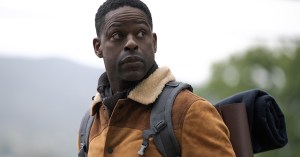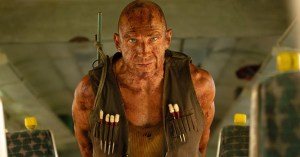Total Recall: Weird Post-Oscar Roles
With The Warrior's Way starring Geoffrey Rush hitting theaters, we run down some notably odd movie choices from Academy Award winners.
This Friday, the martial arts western The Warrior’s Way saunters into theaters, offering one of the most delightfully unhinged genre mashups we’ve seen in some time — and boasting an incredible cast that includes South Korean superstar Jang Dong-gun, Kate Bosworth, Danny Huston, and Oscar winner Geoffrey Rush. Once we rubbed our eyes and blinked a few times to make sure we weren’t reading those names wrong, we got to thinking about other unexpected choices made by Academy-approved actors, and before we knew it, we had a whole Total Recall full of them. From box office hits to ignoble flops, from critics’ favorites to the lowest depths of the Tomatometer, it’s time to celebrate weird post-Oscar roles. Add your favorites in the comments!
Roberto Benigni, Pinocchio
Like plenty of other Oscar-winning actors, Roberto Benigni used the clout he earned with his awards (Best Actor and Best Foreign Film for Life Is Beautiful) to help get his passion project made. And it had plenty of potential, too — Carlo Callodi’s The Adventures of Pinocchio is a classic book, but the character has become more closely identified with its somewhat bowdlerized Disney counterpart, and Benigni could have channeled his love for the book into a more faithful film. Alas, he chose instead to create one of the strangest (and vaguely creepiest) family movies of the 21st century, starring Benigni himself (who also directed and co-wrote the script) as the impish wooden boy. In fairness, it should be pointed out that the international version of Pinocchio did fairly well, but in the States, the English overdubs only compounded the overall weirdness of what unfolded on the screen. As an incredulous Edward Guthmann asked for the San Francisco Chronicle: “What can one say about a balding 50-year-old actor playing an innocent boy carved from a log?”
Marlon Brando, The Island of Dr. Moreau
Arguably the oddest entry on this list (or in the history of modern mainstream film), the 1996 version of H.G. Wells’ classic story The Island of Dr. Moreau features a number of oddball performances and enough behind-the-scenes drama to fill a book. For sheer strangeness, though, nothing beats two-time Best Actor winner (for On the Waterfront and The Godfather) Marlon Brando’s epic turn as the titular lunatic scientist — it’s the crowning achievement of the decades he spent trying to distance himself from his brilliant earlier work, a series of ineffably inscrutable choices whose most memorable moments include the sight of the most talented actor of his generation lathered in pancake makeup and swaddled in a muumuu. “It’s one thing to offer us bristling, salivating hyenas, boars, and tigers with unsettlingly human faces and musculature,” argued Ken Tucker for Entertainment Weekly. “It’s another thing entirely to offer us a Marlon Brando coated in white powder, as if he’d just been dipped in egg and rolled around in flour.”
Nicolas Cage, Bad Lieutenant: Port of Call New Orleans
Best Actor Oscar for Leaving Las Vegas notwithstanding, Nicolas Cage’s career has been a study in cinematic lunacy from the start, to the point that we could single out his relatively sedate performances in The Family Man and The Weather Man as candidates for this list. But there is a point when an actor’s performance circles all the way from “strange” back around to “brilliant,” and that point is Bad Lieutenant: Port of Call New Orleans. A cracked follow-up to Abel Ferrara’s 1992 original, Port of Call stars Cage as a New Orleans police officer whose back injury opens a gateway to drug addiction — as well as a colorful netherworld of movie insanity where Cage rules triumphant as the king of spellbinding, unfettered acting. Calling it “Cage’s best film in years,” Chris Prince of Sky Movies joined the chorus of critical praise for Port of Call, applauding it as “an anarchic gumbo of subverted cop thriller clichés and surreal set-pieces that’s destined to become a cult classic.”
Kevin Costner, Waterworld
Kevin Costner won early acclaim (and his Academy Awards for 1990’s Dances with Wolves) for playing squinty, salt-of-the-earth types who didn’t say much, but managed to get things done when the chips were down. For the legendarily costly Waterworld, a post-apocalyptic adventure drama about a future in which Earth’s continents have been submerged by melted polar ice caps, he retained many of those character traits — with the notable exception that his unnamed protagonist was also a gill-sporting man-fish who refines and drinks his own urine. Plagued by delays, budget overruns, behind-the-scenes drama, and horrible buzz, and trumpeted as a career-killing flop before it even reached theaters, Waterworld ultimately didn’t fare too badly at the box office, grossing just under $265 million. The critics were a slightly different story, however; while most of them admitted Waterworld wasn’t the epic bomb it was made out to be, even the positive reviews read like half-hearted endorsements — like the one written by Desson Thompson of the Washington Post, who shrugged, “If the story seems a little waterlogged, it’s still big, loud, and fun to watch.”
Matt Damon, Stuck on You
A committed actor with a sharp eye for scripts, Matt Damon has compiled an admirably high batting average over the course of his film career, particularly since collecting his Oscar for Good Will Hunting. In fact, even Damon’s oddest movie — a Farrelly brothers comedy about a pair of conjoined twins whose relationship is complicated when one of them decides to pursue an acting career — earned 60 percent on the Tomatometer. Pretty impressive when you consider that Damon spends the whole movie stuck to Greg Kinnear — but it’s the stars that make its singularly unusual premise work, according to James Verniere of the Boston Herald, who wrote, “None of this would have worked without the camaraderie and genuine affection Damon and Kinnear bring to their roles, amazing considering the uncomfortably close quarters they shared making this film.”
Robert De Niro, The Adventures of Rocky & Bullwinkle
De Niro’s movies have made enough money, and earned enough awards (including his Best Supporting Actor nod for The Godfather Part II and his Best Actor trophy for Raging Bull), that he doesn’t need to answer to anyone, and he’s earned the right to take a paycheck gig every now and then — most of which have been standard action thrillers or Fockers sequels. But then there’s 2000’s The Adventures of Rocky & Bullwinkle, the bizarre, De Niro-produced attempt to bring the classic ‘60s cartoon to the screen as a live-action/animated hybrid blending clever meta humor and eyebrow-raising cameos with knuckleheaded slapstick led by Jason Alexander as Boris, Rene Russo as Natasha, and a monocle-sporting De Niro as Fearless Leader. It had all the makings of a spectacular train wreck, but as its surprisingly robust 42 percent Tomatometer demonstrates, Rocky and Bullwinkle had its fans; still, most critics agreed with the Charlotte Observer’s Lawrence Toppman, who accurately predicted, “Kids, who have no interest in these animated characters, will find it slow, arcane and stupid. Adults over 35, who presumably might have loyalty to the old TV show, will find it slow, unfunny and stupid.”
Cuba Gooding Jr., Boat Trip
Gooding’s career since winning Best Supporting Actor for Jerry Maguire has been a case study in weirdness, from stunningly misconceived dramas (Radio) to clunky action (Chill Factor) and a long, long line of direct-to-video titles. Perhaps strangest of all, however, is Gooding’s fondness for cartoonishly broad comedies such as Snow Dogs, Daddy Day Camp, and the amazing-for-all-the-wrong-reasons Boat Trip. Starring Gooding and Horatio Sanz as two friends tricked into going on a (gasp!) gay cruise, Boat Trip leaves no spit take unsprayed, no hoary stereotype forgotten, and no career undamaged; it is, as David Noh observed for Film Journal International, “one of those movies you experience with dropped jaw, wondering what the hell the filmmakers thought they were doing and how desperate could the actors have been to agree to be in it.”
Lee Marvin, Paint Your Wagon
People went to see Lee Marvin movies for pretty much one reason: to watch one of Hollywood’s toughest sons of guns in hard-boiled action. He earned points (and his Best Actor Oscar) for stretching with the 1965 comedy western musical Cat Ballou, but Marvin shouldn’t have pressed his luck with this three-hour, Paddy Chayefsky-adapted musical about polygamist miners — a deeply surreal experience co-starring Clint Eastwood, who, along with Marvin, did his own singing. It’s the sort of thing that needs to be seen to really be believed, although The Simpsons did a fine job of parodying its cheerful lunacy in the classic “All Singing, All Dancing” episode, which is many times more entertaining than the movie Filmcritic’s Christopher Null derided as “About as fun as painting a wagon.”
Meryl Streep, Death Becomes Her
Meryl Streep rose to prominence with a series of excellent, award-winning dramas that included Kramer vs. Kramer and Sophie’s Choice (both of which earned her Oscars), making her name synonymous with Kleenex-dampening quality. During the early 1990s, however, she grew restless, taking on a number of projects that fell outside her established image, including She-Devil, The River Wild, and Defending Your Life. Oddest of them all? 1992’s Death Becomes Her, a special effects-laden screwball farce about a pair of women (Streep and Goldie Hawn) whose squabble over a mild-mannered plastic surgeon (Bruce Willis) reaches supernatural levels. Loaded with talent onscreen and off (the supporting cast included Isabella Rossellini, and it was directed by Robert Zemeckis), Death was an almost $150 million hit, despite reviews that ranged from lukewarm to outright hostile (Ken Hanke of the Asheville Mountain Xpress labeled it “Further evidence that Zemeckis is the Anti-Christ”). Because where else are you going to see Meryl Streep gawping around with her head on backwards?
Christopher Walken, The Country Bears
Before The Pirates of the Caribbean proved that it’s possible to spin an entire film franchise out of a Disneyland attraction, 2002’s The Country Bears served as a mangy reminder of why turning to theme park rides for cinematic inspiration is almost always a very bad idea. But to its everlasting credit, Bears wasn’t content to settle for boring badness; alongside the usual punny gags, including a lead character named Beary and a soundtrack including songs like “We’re Only in It for the Honey,” it includes an astounding, Razzie-nominated turn by the man who won a Best Supporting Actor Oscar for The Deer Hunter as a villain named Reed Thimple. A costly flop, Bears found supporters in a handful of critics — including David Nusair of Reel Film Reviews, who pronounced that it “just might be worth a rental if only for the sight of watching Christopher Walken belt out a musical number using only his hand and his armpit.”
Take a look through the rest of our Total Recall archives. And don’t forget to check out the reviews for The Warrior’s Way.
Finally, we’d like to present perhaps the weirdest post-Oscar role: the winner of the 1941 Academy Award for Best Original Screenplay as a wine pitchman:






